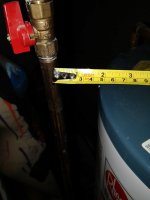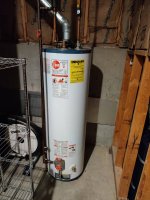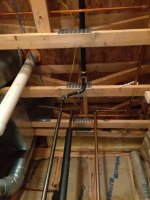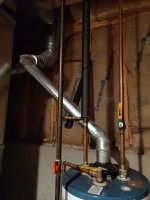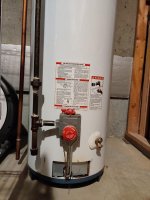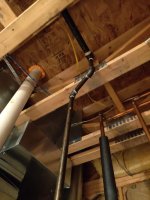Jandrewstein
New Member
I'm installing a new water heater which is a little larger diameter. Everything is currently hard-piped and I'd like to keep it that way. The 1/2" black steel gas line will probably not line up, so I'm looking to modify it. It drops at least 10' from the ceiling where there are a couple bends. If I could tighten one of those joints it would push out the entire pipe drop which might help to line it up with the new water heater.
I'm not all that familiar working with black steel pipe. My concern is that even a small tightening turn in a 15 year old connection might mess up the seal. It looks like white pipe dope was used at all joints. I can't tell if Teflon tape was also used.
It's also located before the gas shutoff, so I would have to find the master shutoff if there is any concern about causing a leak (which is at the meter -- this is a townhouse).
So what do people think about tightening a 15 year old 1/2" black steel gas supply line about 1/8 of a turn without redoing it entirely?
Alternatively, there may be enough flex in the 10-foot length of pipe to accommodate the larger diameter of the new water heater. I won't know that until I try to fit it up. I don't have good intuition with this type of pipe.
I'm not all that familiar working with black steel pipe. My concern is that even a small tightening turn in a 15 year old connection might mess up the seal. It looks like white pipe dope was used at all joints. I can't tell if Teflon tape was also used.
It's also located before the gas shutoff, so I would have to find the master shutoff if there is any concern about causing a leak (which is at the meter -- this is a townhouse).
So what do people think about tightening a 15 year old 1/2" black steel gas supply line about 1/8 of a turn without redoing it entirely?
Alternatively, there may be enough flex in the 10-foot length of pipe to accommodate the larger diameter of the new water heater. I won't know that until I try to fit it up. I don't have good intuition with this type of pipe.

